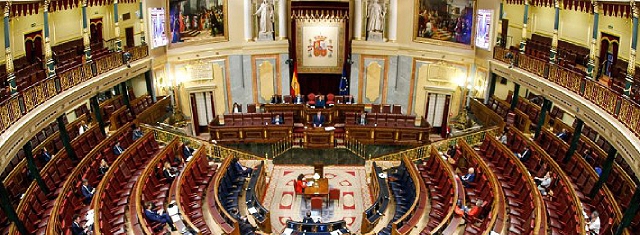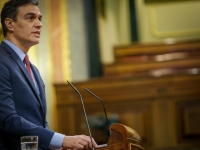Politics
Spanish Parliament approves a new extension of the state of alarm
Until April 25, but there will be more

(Source: Congress of Deputies press services)
USPA NEWS -
Spain will probably need a third extension of the state of alarm in the fight against the Coronavirus, announced on Thursday the President of the Spanish Government, Pedro Sánchez, during the parliamentary debate on the extension of the confinement of the Spaniards until next April 25. The Congress of Deputies approved the extension of the confinement, but was warned that, in all likelihood, it will not be the last and the state of alarm will need to be extended until at least May 11.
Pedro Sánchez again asked for loyalty to the parliamentary groups and their support for the measures that the Spanish Government is taking against the Coronavirus pandemic. He noted that the recent increases in the number of new infections and deaths, after five days of decreases, is due to the fact that the Spanish are contagious in their homes. This claim was harshly contested by opposition groups, contradicting official explanations that confinement has managed to curb contagions. Sánchez insisted that the situation in Spain has improved and stressed the need to consolidate the improvement.
The extension of the confinement until April 25 was supported by all the groups, except for the formation of the far-right Vox and the independence parties - 270 votes in favor, 54 against and 25 abstentions. The main opposition party, the conservative Popular Party, supported the extension, but was very critical of the Prime Minister, whom he accused of "dynamiting all bridges of understanding with the Popular Party." The opposition leader, Pablo Casado, asked Pedro Sánchez if "this is what he understands by a reissue of the Pacts of the Moncloa." And he warned the Prime Minister that conservative support for his policies is hanging by a thread.
"The Spanish deserve a government that does not lie to them, a government that always tells them the truth. For the more than 14,800 deceased and their families; 150,000 infected; 60,000 hospitalized; half a million doctors and nuerses that risk their lives and 47 million confined Spaniards,“ explained Pablo Casado during the debate, which started at 9 in the morning and lasted until night. The opposition parties accuse the Pedro Sánchez Government of lying in the official death figures, since the death records are higher than those of other years at this time and those announced by the Government and, in addition, they are not considered deaths by Coronavirus those that are registered in private homes and without the patients having been administered the test confirms the existence of the disease.
Faced with criticism, President Sánchez defended the management of his government. "All of Europe was late, but Spain acted earlier," he said during the debate. “The global magnitude of this pandemic is terrifying, vertiginous. These are shockingly extraordinary times that require exceptional measures," he added and justified that "confinement remains an essential measure. The alarm state is working and we see how the fire that sparked the pandemic begins to be under control. We begin to see the end of the road and we cannot back down.“
He announced that the Government is already working on the transition to normality. To do this, next week it will convene political parties, regions and social partners, in order to reach agreements that allow the economy to start up. "If the ascent has been hard, the descent will not be less, it will be progressive," he warned. “We will have to reformulate some aspects of our way of living, but that will be later. There is still time," he added. And he offered data: the economic impact of the measures adopted by the Government amounts to 128,868 million Euros, of which 4,000 have been for the health sector and 1,100 in social aid.
Liability for this article lies with the author, who also holds the copyright. Editorial content from USPA may be quoted on other websites as long as the quote comprises no more than 5% of the entire text, is marked as such and the source is named (via hyperlink).






